Carolyn Donovan, GSS ’16, works at P.S. 86 in the Bronx, where she provides both individual and small-group counseling and is part of the school’s crisis team. At Fordham’s Graduate School of Social Service, she specialized in trauma and did her field placement at a foster care placement office while also working at the Good Shepherd Services’ family foster care program in the Bronx.
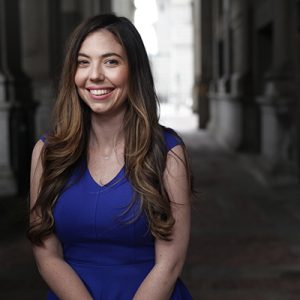
Every day at P.S. 86 is different, as Donovan helps connect families to the resources they need, whether they’re struggling with housing, food, or an immigration matter.
“Social work is a unique field,” she said. “It’s multidimensional and you get to make a difference and advocate for the well-being of the people you’re working with.”
Preparing ‘Agents of Change’ to Meet a Growing Need
Demand for social workers in the New York City area and across the country is skyrocketing, fueled by the mental health crisis during the pandemic as well as the aging of the Baby Boom generation. The U.S. Bureau of Labor Statistics projects that employment for social workers will grow faster than the average for all occupations, increasing by 9% by 2031 with about 74,900 openings predicted for each year.
Debra M. McPhee, Ph.D., dean of the Graduate School of Social Service, said the work of professional social workers is critical during these complex times.
“In this era of great change and global racial reconciliation, the need for knowledgeable, skilled, and compassionate professional social workers is as great as it has ever been. Social workers bring a unique perspective to society’s most challenging problems, serving as agents of change whether they are working with individuals, families, organizations, or communities,” McPhee said.Steeped in the Jesuit tradition of cura personalis—care for the whole person—Fordham runs the largest school of social work in New York state, graduating 1,000 students each year who go on to work in a range of settings, including public agencies, nonprofits, hospitals, and schools. Because of Fordham’s long, rich history in social work, students benefit from a supportive alumni network and from courses taught by faculty members with deep expertise in the field.
A Connection with NYC Schools
Roger Ball, GSS ’02, is a GSS adjunct faculty member and supervisor of school social workers for the New York City Department of Education. He said that Donovan’s holistic approach at P.S. 86 is a hallmark of Fordham graduates. A social worker from Fordham will take the initiative to seek partnerships with community-based organizations, he said, and find resources for the families at their schools.
“They aren’t just going in to provide clinical intervention,” Ball said. “GSS students at Fordham are learning about human rights, social justice, environmental justice, and economic justice, and they’re going in with that lens.”
Ball noted that GSS also works with NYC DOE schools on professional development for social workers, guidance counselors, assistant principals, and principals.
“That part gives the opportunity to go deep and build capacity,” Ball said. “These are resources that a lot of schools can’t afford. It allows kids to get the social-emotional and learning support and allows our emerging clinicians to get a rich body of experience.”
During the COVID-19 pandemic, the NYC DOE hired more than 400 social workers—“the largest amount at any point that I can remember in public education,” Ball said—and the schools still need more.
Leadership in Caregiving
Ellen Travers, GSS ’22, never planned to become a social worker. A former media planner and a mother of four, Travers’ path took a turn when two separate health crises rocked her family.
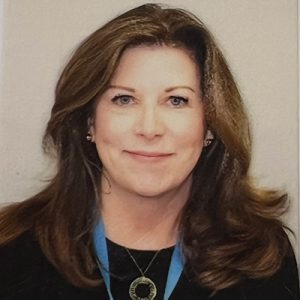
First, she served as the primary caregiver for her elderly father until he passed in 2006. That experience led her to volunteer at the Ken Hamilton Caregivers Center at Northern Westchester Hospital, which provides resources and support to caregivers. Then her husband, Paul, received a devastating diagnosis of metastatic renal cancer. She cared for him until he died in 2018.
Having navigated the complex medical, legal, financial, and emotional terrain of being a caregiver twice, Travers realized that social work was her true calling. In 2019, she enrolled in the Graduate School of Social Service. After finishing the MSW program and passing the licensing exam last year, she returned to the Ken Hamilton Caregivers Center—this time as the program manager.
“I needed to do something with all this caregiving in my life,” Travers said. “Getting a master’s degree in social work tied together my life circumstances with meaningful work. If you’ve been on the caregiving side, you understand the need. It’s impactful, it’s very simple, and it’s the right thing to do.”
Focusing on hospital social work, Travers was particularly interested in evidence-based interventions for the geriatric population. “I received an incredible education because of some exceptional professors who are professionals in the social work field,” she said. “I was fortunate to have access to the Henry C. Ravazzin Center on Aging and Intergenerational Studies and have Professor Janna Heyman as a mentor.”
A Flexible Program with a Variety of Specializations
A GSS education is designed to be flexible, both in terms of scheduling and curriculum, said Melba Remice, the assistant dean of admissions. Students can enroll full-time or part-time, taking evening and weekend classes at either the Lincoln Center or the Westchester campuses. GSS also offers hybrid and online options.
Students have the freedom to tailor their studies to their area of interest. In the first half of the program, all students receive the same foundational courses. In the second phase, they pursue their own course of study, which can include trauma, palliative care, and global policy through a unique collaboration with the United Nations. Most students are required to participate in two field placements.
Scholarships and Fellowships
One challenge to increasing the pipeline of social workers is the cost of a master’s degree. Almost half of new social workers are the first generation in their families to graduate from college, and affording graduate school can be difficult.
Fordham offers a number of scholarships and fellowships to help MSW students, including the Palliative Care Fellowship and the PIPELINE for Youth Health Fellowship program.
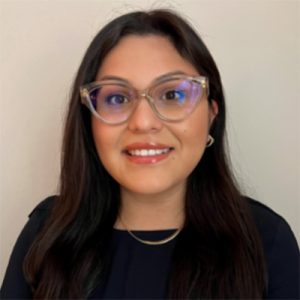
For Jessica Castillo, earning her MSW has been made possible by the Centennial Scholarship Award from Fordham GSS and Catholic Charities, which was established in 2018 and provides full tuition.
A first-generation Mexican-American who was once a mentee at Bigs & Littles, she returned to the organization to work as their receptionist after completing her undergraduate degree at St. John’s University in 2016. The Bigs & Littles staff encouraged her to go into social work and apply to Fordham.
Castillo now works full-time as the communications and development officer at Bigs & Littles NYC Mentoring and takes classes in the evening. She can already connect what she’s learning in her classes with the interactions she observes between social workers and clients at work.
“Bigs & Littles helped me so much and I want to give back,” Castillo said. “I had been thinking about going into social work, but I didn’t have the funds. Getting this scholarship felt like winning the lottery.”
‘The Force for Hope and Light’
For Donovan, Fordham’s ingrained commitment to social justice and the education she received prepared her for the realities and challenges of social work.
“In the field, you are going to come up against things where you need to be the force for hope and light,” she said. “Because I had a strong foundation from my classes and my professors, I was able to translate that into actual practice.”
FORDHAM GRADUATE SCHOOL OF SOCIAL SERVICE ADMISSION INFORMATION
Apply: Visit GSS for more information on prerequisites and the application process.
Information Sessions: Register for an information session or email [email protected] to schedule an appointment.
Upcoming Open Houses: Fordham GSS will hold open houses for its Westchester (4/15) and Lincoln Center (4/17) campuses. Learn more and register here.
—Mariko Beck
]]>
The chair is named for the late James Dumpson, a social worker, professor, and administrator who served as dean of GSS from 1967 to 1974. He began his career as a children’s caseworker and rose to become New York City’s first Black welfare commissioner in 1959. Like Dumpson, Williams-Isom has focused her career on helping children thrive.
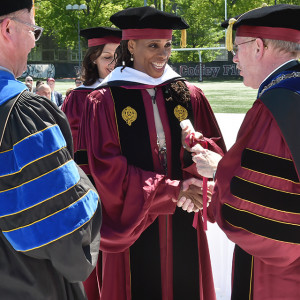
“For me to be able to come back [to Fordham] and really think about service and what it means to serve the most vulnerable is an honor. Put that together with Professor Dumpson’s vision—and as an African American woman—I think he would be super proud to see me in this position,” said Williams-Isom, who is stepping down from her post at the Harlem Children’s Zone (HCZ) at the end of this month after six years as CEO.
Williams-Isom was raised in Queens by a single mom who always stressed the value of a good education. After completing her bachelor’s degree in psychology and political science at Fordham College at Lincoln Center, she went on to graduate from Columbia Law School. But she has seen the toll that crises and a lack of resources can take on a community’s children, and she is acutely aware of how the right support could propel young people and their families out of poverty.
On her return to Fordham in the Dumpson Chair, she will work with faculty and students to develop research, programs, and policy analyses that improve services to at-risk children and families. She’ll also develop a collaboration between the Graduate School of Social Service, Fordham Law School, and the Gabelli School of Business to create a leadership institute for students, practitioners, and agency leaders committed to change around issues of race and justice. She will also continue on as a member of the University’s President’s Council.
“GSS has gained an experienced, caring, and creative leader in Anne Williams-Isom,” said Debra M. McPhee, Ph.D., dean of the Graduate School of Social Service. “Her extensive knowledge of the needs of children and families has served to elevate the voices of New York City’s most vulnerable communities. We are proud to have such an outstanding partner in advancing the school’s commitment to racial and social justice.”
For Williams-Isom, connecting children’s services with other social services has been a constant throughout her career. At the Harlem Children’s Zone, she runs innovative “cradle to career pipeline” programming that aims to break the cycle of intergenerational poverty. From life-shaping early childhood, education, and career programs to community outreach and wellness initiatives, HCZ focuses on creating opportunities for children, families, and communities to thrive.
Before joining HCZ, she advised them on integrating neighborhood-based nonprofits into the schools. At the time she was deputy commissioner of New York City’s Administration for Children’s Services, a post she rose to after 13 years in a variety of leadership roles at the agency.
Child welfare isn’t about taking children out of bad homes, she said, it’s about providing parents with the support they need to raise kids safely and give them access to opportunities. To that end, bringing social services closer to the classroom is key.
Williams-Isom noted that while the COVID-19 pandemic has proved challenging for families, attendance at HCZ remains high, with 95% of elementary and high school students signing in remotely from home. She said the participation speaks to the desire of parents to be involved in their children’s education.
“Even with this, parents were sitting with their kids, learning, finding out resources in the community so that they could provide for their families because they don’t want a learning loss for their children,” she said.
She said that she plans to take a similar holistic approach toward educating social workers at Fordham. And as a lawyer, she knows that social workers don’t have a monopoly on social justice issues. She looks forward to mingling with future lawyers from Fordham Law, future nonprofit leaders at the Gabelli School of Business, and, of course, future teachers from the Graduate School of Education.
“I’ve been talking for years about a holistic approach to our children and families,” she said. “I can quietly say, I think attending to somebody’s spirit is very important, especially with the trauma that we have seen, based on the policies under which disenfranchised folks have had to live in this country.”
Williams-Isom is currently pursuing her doctorate of ministry. She said that she is pleased to be teaching at a Jesuit institution where cura personalis, care for the whole person, includes the spirit.
“I’m excited about being able to speak to people’s spirit and the soul work that each one of us needs to do in order to bring about real change in this country,” she said.
“Jesus was a revolutionary and he was working with the disenfranchised,” she said. “But this is less about preaching and more about using our voices to call out injustices where we see them, and inviting people to be a part of the solution.”
]]>“What Matters to Me (and Why),” a series of lunch-time discussions held at the Lincoln Center, Rose Hill, and Westchester campuses, was part of the programming tied to Ignatian Heritage Week.
For Anne Fernald, Ph.D., special advisor to the provost for faculty development, and Debra McPhee, Ph.D., dean of the Graduate School of Social Service, their talk at the Lincoln Center Campus centered on three Cs: contribution, community, and change.
The Three Cs
They kicked off the afternoon by asking the audience how they contribute to their community. McPhee noted that recent studies show that the feeling of making a tangible contribution to society has a greater effect on people’s happiness than any other variable.
“It’s kind of a shocking thing, right? You’d think it’d be health or money, or something like family. But it’s really contribution that was the most significant element, whether the person is in the workplace or out of the workplace,” she said.
“It resonates with both me and Anne in terms of what drives us to be in the profession we’re in, and the work we do at Fordham.”
Of course, the concept of the community that one might contribute to has changed radically in recent years. Fernald recounted how she’d reunited this summer with a friend she hadn’t seen in 20 years. The meeting only happened because they realized, via Facebook, that they were going to be visiting the same upstate New York region at the same time.
Her friend was dropping her son off at a camp for trampoline enthusiasts. He had developed a passion for the activity, and bonded over it with other campers, via videos of their exploits shared on Instagram. Up until that point, though, he’d never met them person.
“When he got out of the car, she said it was amazing. There were a dozen other 14-year-old boys who saw him, and said ‘Emmitt’s here!’ And they all enveloped him in this giant hug, and then went over the trampoline to show each other their flips in person.” Fernald said.
“So, when we think about community for our students, it’s not the same kind of community that’s anything like what any of us grew up in.”
Beware the Temptation to Restrict Your Circle
McPhee said a major challenge for older generations is appreciating the positive aspects of online life while acknowledging the pitfalls. Older generations’ conceptions of community were constrained by geography, and were therefore more limited, whereas young people can be pickier and limit their circle to say, only fellow teenage male trampoline enthusiasts. There is a potential downside to this, she said.
“When you can pick from the whole world, most are going to pick those that are like you, as opposed to those that are different. So do we navigate that difference better because we have a more global perspective, or do we actually restrict ourselves because we just sing to the choir and go to the people who are interested in what we’re interested in? I don’t know that we have an answer to that,” she said.
Embrace Change
All of this leads to the third C, which is change. Long gone are the days when educators are the keepers of information, said McPhee.
“My students can Google anything I’m going to tell them before they walk into a classroom, so what does that do to the nature of what we’re doing? That “sage on the stage” bit gets challenged quite a bit in terms of what it means for the entire institution, how we react to teach other, how we see our own jobs, and how we see change.”
That, said Fernald, is why the class environment is more important than ever: She challenged everyone to imagine ways to make the classroom an occasion for students to imagine themselves as each other’s colleagues in learning. Both acknowledged how easy it is to accept the narrative that says that anyone under 30 is not engaged in the world, is not a critical thinker, and is not engaged in community. It’s a narrative that should be rejected.
“Those in charge of the education need to bring their whole self to it, and say ‘This is hard for me, it doesn’t resonate with me, but I need to look at the gap. I need to look at the difference,” McPhee said.
“The current challenge in front of us is, how we engage that narrative, and how we engage the change that’s right in front of us.”
It was a day of reflection for staff, faculty and students throughout the Fordham community. Dorothy Marinucci, associate vice president for presidential operations, and John Kezel, Ph.D., director of the Office of Prestigious Fellowships, hosted a What Matters to Me luncheon at the Rose Hill campus. Stephen McGowan, recruiter and admissions associate at the Graduate School of Social Service, and Joan Cavanagh, Ph.D., director of spiritual and pastoral ministries in the Office of Campus Ministry, hosted one at the Westchester campus.
]]>-eyes+copy.jpg)
“It’s a privilege to join the school’s outstanding faculty, staff, and students in creating the next phase of our history,” said McPhee, who recently welcomed the incoming class of 579 students studying at GSS to earn a master’s degree in social work. “I’m excited to be an active member of a school and a university that cares so much about its students and making a real and positive difference in the world.”
From 2005 to 2010, McPhee was dean of the School of Social Work at Barry University in Miami Shores, Fla., where she had also served as associate dean and a faculty member. For the last two years she was the chief operating officer for the Palo Alto, Calif.-based Planet Hope – Liiv.com, a firm that specializes in online health education and technology.
An award-winning educator, McPhee has taught a variety of courses, from introductory social work practice to graduate courses on policy issues in family and children’s services. Her primary areas of research, in which she has published widely, include international healthcare policy, child abuse and neglect, women and welfare reform, public policy analysis, and professional practice and service delivery.
“In the New York region and across the country there’s a greater need than ever for professional social workers who are prepared for leadership and professional practice,” she said, adding that she shares GSS’s “deep commitment to human rights and social justice and to educating highly skilled and competent professionals to work on behalf of our most vulnerable populations.”
No stranger to New York, McPhee earned her master’s degree from the School of Social Work at Columbia University in 1989. She received her doctorate in 1998 from the Faculty of Social Work at the University of Toronto.
The first GSS class McPhee will preside over as dean is quite diverse. More than 40 percent of students are non-white; 40 students are originally from other countries, including two international students who came to the school from China and one who came from Ghana.
McPhee replaced Peter Vaughan, Ph.D., who retired in the spring after 13 years as GSS dean.
]]>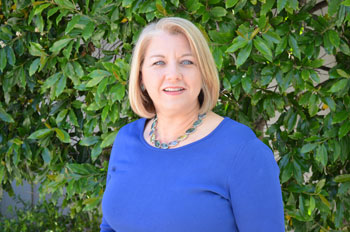 Fordham University has announced the appointment of Debra M. McPhee, Ph.D., as the new dean of the Graduate School of Social Service (GSS). She replaces Peter Vaughan, Ph.D., who will retire at the end of this academic year.
Fordham University has announced the appointment of Debra M. McPhee, Ph.D., as the new dean of the Graduate School of Social Service (GSS). She replaces Peter Vaughan, Ph.D., who will retire at the end of this academic year.
McPhee brings extensive professional experience to her new post, having served for more than a decade in various clinical, academic, and administrative roles. She worked for the last two years as chief operating officer for the Palo Alto-based Planet Hope/Liiv.com, a firm that specializes in online health education and technology.
From 2005 to 2010, McPhee was dean of the School of Social Work at Barry University in Miami Shores, Fla. Before becoming dean, McPhee served for three years as associate dean and had been a faculty member since 1997. An award-winning educator, she taught a variety of courses, from introductory social work practice at the undergraduate level to graduate courses on social policy issues in family and children’s services.
McPhee also held academic lecturer appointments at the University of Toronto and at Ryerson University in Toronto, where she served as field practicum coordinator. In addition, she worked for the U.S. Army in the Netherlands as chief of social work services for the 7th Medical Command and as an instructor in the family advocacy program.
She earned her doctorate in 1998 from the Faculty of Social Work at the University of Toronto, her master’s degree from the School of Social Work at Columbia University in 1989, and a bachelor’s degree in psychology from Saint Mary’s University in Halifax, Nova Scotia in 1986.
Her primary areas of research, in which she has published widely, include international health care policy, child abuse and neglect, women and welfare reform, public policy analysis, and professional practice and service delivery.
“In Debra, we have an outstanding new dean who is committed to working closely with the faculty, students, and staff of the Graduate School of Social Service. Together, they will sustain and advance the school’s long tradition of national preeminence in educating skilled, compassionate social workers to serve the human family,” said Stephen Freedman, Ph.D., provost of the University and professor of ecology and evolutionary biology.
“We also acknowledge with deep gratitude Dr. Peter Vaughan, who has served Fordham and the Graduate School of Social Service with great distinction.”
]]>